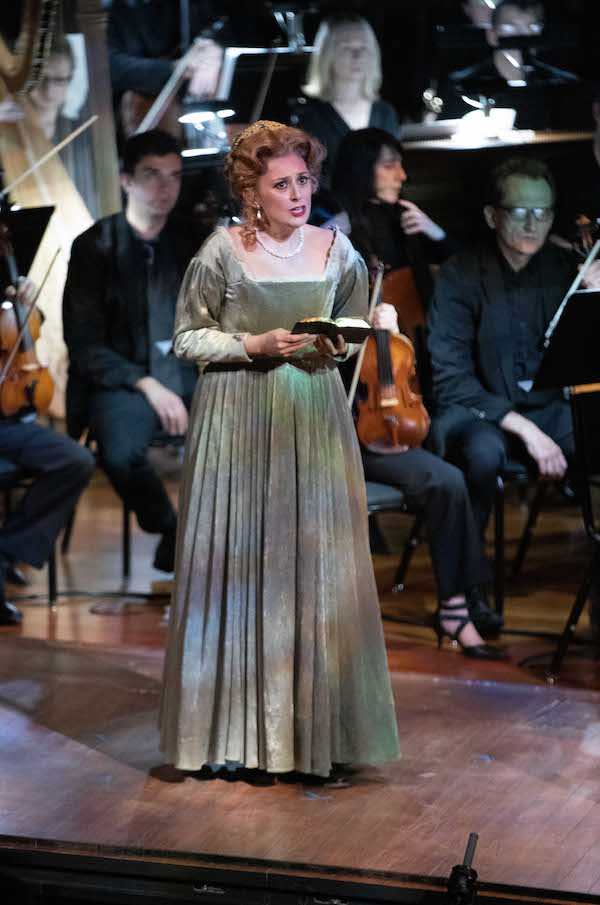Compelling music, inert drama in belated premiere of “The Chronicle of Nine”

During the early months of 1554, Lady Jane Grey sat anxiously in the Tower of London. She had come there the previous summer to be crowned Queen of England, taking over from Edward VI, who had died unexpectedly from tuberculosis. But instead, the tower had become her prison. As the English public united around the legitimate queen Mary Tudor, Jane, declared guilty of treason, awaited her execution by beheading.
The nine-day reign of Queen Jane is the focus of Arnold Rosner’s opera The Chronicle of Nine, which the Boston Modern Orchestra Project and Odyssey Opera offered in its belated world premiere Saturday night at Jordan Hall.
Composed in 1984, The Chronicle of Nine is the story of an unexpected rise to power and the tragedy that ensues for ending up on the wrong side. Florence Stevenson’s libretto centers upon Jane, who is chosen by Edward to be his successor in the hopes that she will continue the purification of the Anglican faith from Catholicism, the religion earnestly practiced by Edward’s half sister, Mary. But Jane is a mere pawn for her conniving parents, Henry and Frances Grey, and John and Lady Dudley, who arrange her marriage to Guilford Dudley to secure a new royal dynasty. For much of the opera, Jane is a reluctant participant, yet she remains steadfast in her innocence. Though accused of treason, she ultimately dies a martyr.
Yet for all of its historical intrigue, the drama of The Chronicle of Nine falls flat. Stevenson’s dialogue too often resorts to narrated exposition rather than a natural reveal of emotions. Some of the lines are pure clunkers: “Edward was king, but he was ill and slight. And it passed, friends, that he died one night”—hardly the stuff of great Tudor sonnets.
In addition, Stevenson’s lazy storytelling curiously eliminates elements from the plot that could potentially flesh out the one-dimensional characters. Key events of the story, including Mary’s seizure of the throne, is simply told as backstory, making it difficult to get a sense of just how terrified Jane was in her placement in such events. Rather than grand opera, The Chronicle of Nine feels more like an episode from David Starkey’s Monarchy documentaries, only set to music.
Rosner’s attractive music tempers those problems and can stand on its own merits. (The composer mined the opera’s music for his Symphony No. 7). Lush, lucidly scored, and rhythmically exciting, the music for The Chronicle of Nine shows the American composer at the height of his powers.
For much of his creative life, Rosner (1945-2013) eschewed twelve-tone and avant-garde trends in favor of a romantic idiom drawn from his studies of the works of Ralph Vaughan Williams and Alan Hovhaness. The Chronicle of Nine resembles the styles of both composers. Shifting modal inflections bring a sense of mystery to each line, and the dances even bear the rhythmic pulses of Tudor-era styles.
Yet Rosner’s music is wholly original. Dissonances, drawn from his unique combinations of major and minor triads, add requisite tension as the lines unfold in grand arcs. Gil Rose and company, who won a Grammy award for their recording of Tobias Picker’s Fantastic Mr. Fox last week, made a strong case for this haunting score.
Saturday’s performance featured a stellar cast of singers.
As Jane, Megan Pachecano sang with a bright, nimble soprano that channeled an innocence and deep spirituality. Her singing of “Into thine hands” from Act 1 conveyed profound faith and solace in the face of an uncertain future. Likewise, her duet with tenor Eric Carey, as her husband Guilford, in Act 3 had all the tenderness and intimacy of a couples’ reunion. In his brief role, Carey’s voice carried just enough weight to express his deep love for Jane.
Baritone Aaron Engebreth and mezzo-soprano Krista River made for a humorous and conniving pair as John Dudley and Lady Dudley respectively, each singing with the assurance of a couple looking to climb the social ladder. So too did tenor William Hite and mezzo-soprano Rebecca Krouner, who made an equally scheming duo as Henry and Frances Grey.
James Demler brought a bold, cavernous baritone to the role of the Earl of Arundel, a man secretly vying for Queen Mary in order to seek revenge on the Dudleys. Baritone David Salsbery Fry answered Demler with robust tones of his own as Arundel’s duplicitous partner, the Earl of Pembroke.
Alto Stephanie Kacoyanis made for a torn and even sympathetic Mary, her rich, dark singing capturing the queen’s fear that putting Jane to death would be an ill omen of a troubled reign. As the minstrel, Gene Stenger sang with clarion tenor and a storyteller’s grace.
Prepared by Mariah Wilson, the BMOP and Odyssey Opera Chorus brought flair to the few crowd scenes, their clear diction especially conveying both wry humor and impending doom during Jane’s execution.
The singers made effective use of the space in this semi-staged performance. Chairs, tables, and even chopping bock were just enough to set the scenes in the Dudley house and Tower of London. Period costumes added light splashes of red, white, and yellow.
Throughout, Gil Rose’s stick was swift and incisive, and he delivered a stirring reading. The strings responded deftly to his guidance, playing the accompaniment and ballets with sweep, grandeur, and gentle lilt. Kudos to trumpeters Terry Everson, Michael Dobrinski, and Rich Kelley, who projected the many fanfares and soaring high notes with power and brilliant precision.
Odyssey Opera will present Rossini’s Elisabetta: Regina d’Inghilterra 7:30 p.m. March 13 at the Huntington Avenue Theatre. odysseyopera.org
Posted in Performances




